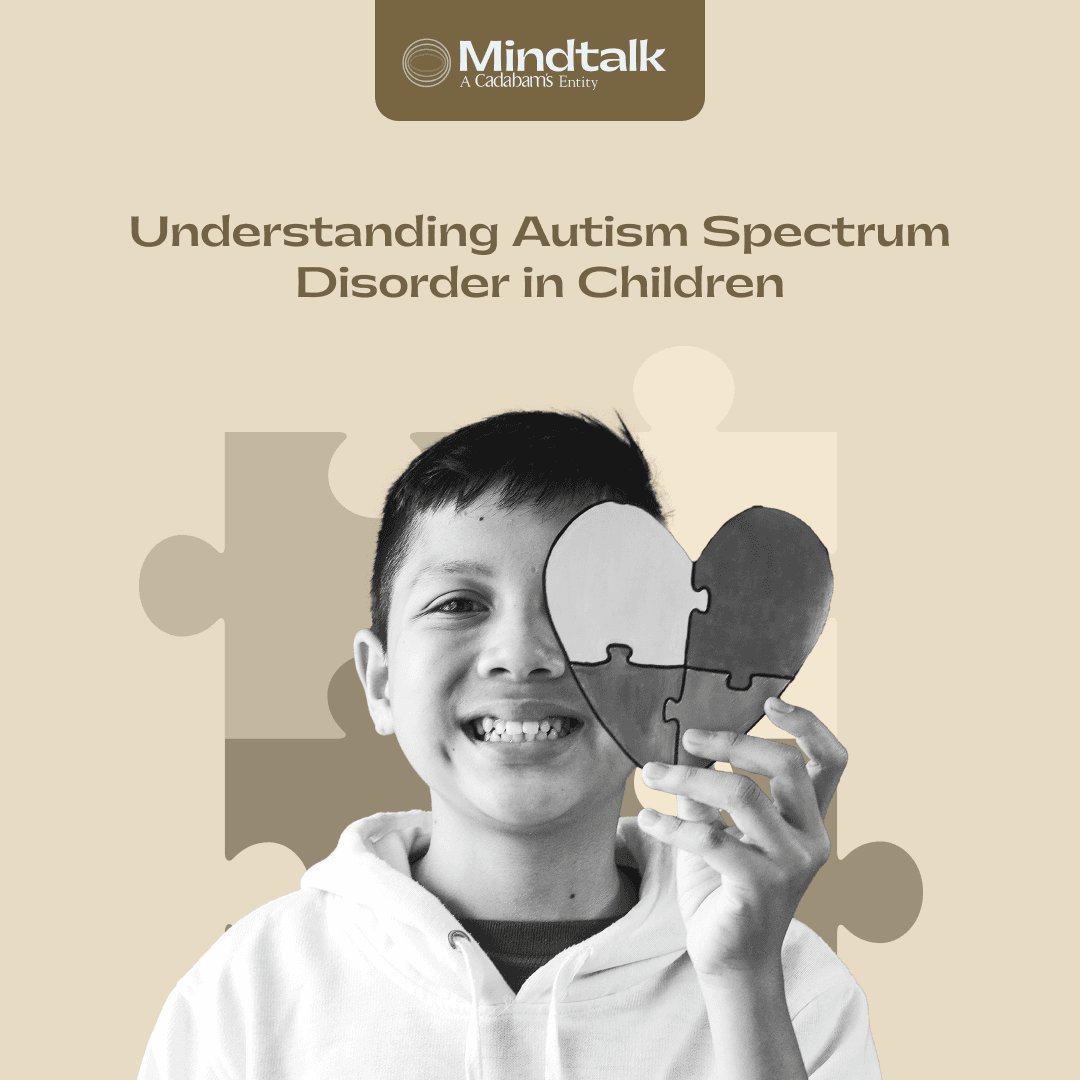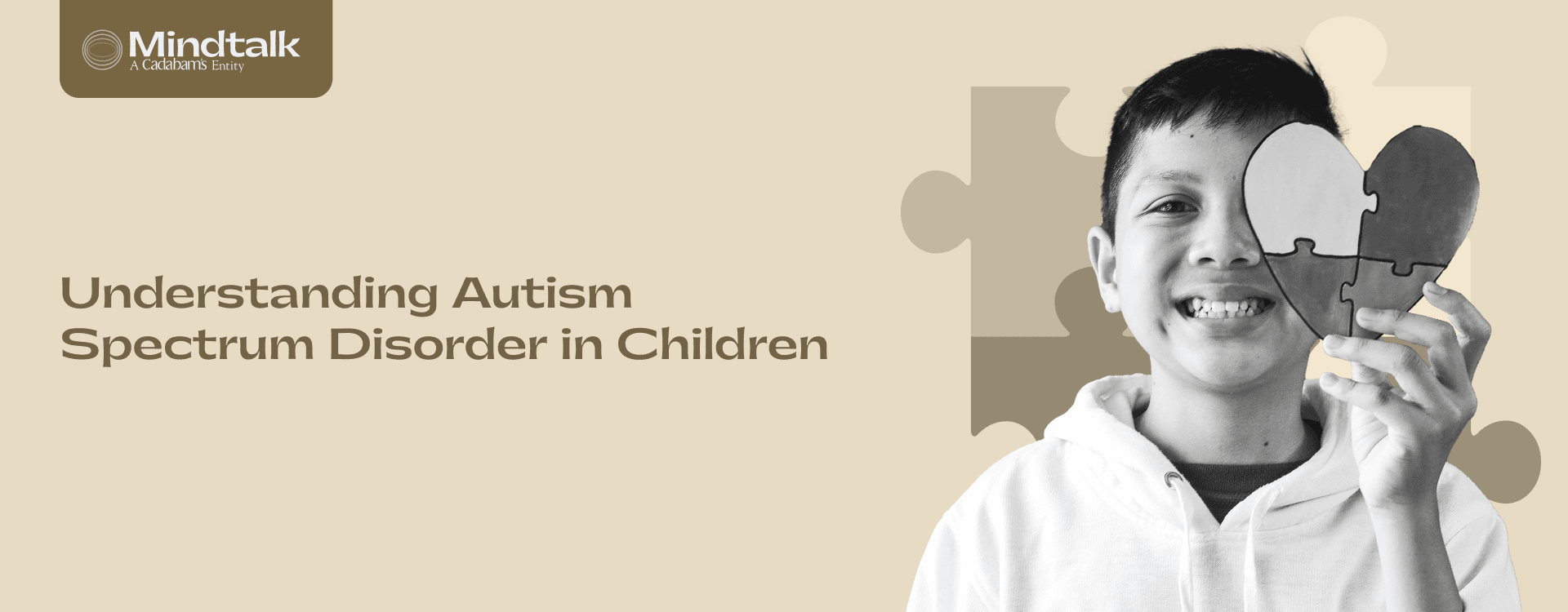Understanding And Supporting Children With Autism

This blog is a guide for parents to understand Autism Spectrum Disorder in children. It covers early signs, diagnosis, challenges, and ways to support children with ASD.
What Is Autism Spectrum Disorder (ASD)?
Autism Spectrum Disorder (ASD) in children is a developmental disability that affects how people interact with the world. It can cause challenges with social communication, repetitive behaviors, and sensory processing. However, people with ASD in children also have many strengths and unique ways of thinking.
Early Signs And Symptoms Of Autism In Children
While autism spectrum disorder (ASD) can present differently in each child, some early signs may appear in social interactions, communication, and play. Here's a closer look:
Social behavior And social Understanding
Limited eye contact, preferring to play alone, difficulty taking turns or sharing toys, lack of interest in social games or pretend play, appearing unaware of or confused by others' emotions, and challenges understanding social cues like facial expressions or body language.
Speech And language
Delays in spoken language development, unusual speech patterns (e.g., flat monotone, sing-song voice), repetitive use of words or phrases (echolalia), difficulty following conversations or engaging in back-and-forth communication, and struggles with understanding the meaning or intent behind language.
Restricted Behavior And Play
Repetitive movements like flapping hands, rocking, or spinning. Strong insistence on routines and becoming upset by changes, intense focus on specific objects or topics, unusual play patterns like lining up toys or fixating on a particular part of a toy, limited imagination or difficulty with pretend play.
Diagnosis And Understanding Autism
Diagnosing autism typically involves a comprehensive evaluation by a healthcare professional, considering a child's developmental history and behavior.
The Process Of Diagnosing Autism
There's no single test for ASD. Diagnosis often involves assessments, observations, and interviews with parents and the child, and may consider genetic testing. Early diagnosis is crucial for accessing interventions and support.
Challenges And Misconceptions About Autism
Autism is a spectrum disorder, meaning experiences vary. Common misconceptions include assuming all autistic people lack intelligence or social skills. In reality, autistic people have diverse strengths and talents, and may excel in areas like focus, memory, or creativity.
Parental Guidance For Autism
Supporting your child with autism requires patience, understanding, and a commitment to creating a structured and nurturing environment. Parental guidance for Autism and supporting a child with autism involves a combination of understanding, support, and specific strategies to promote the child’s development and well-being.
Take Your Child Along For Everyday Activities
Including your child in daily routines helps them feel connected and provides opportunities to learn new skills. Adapt activities as needed, but aim for gradual exposure to different environments.
Stay Consistent And On Schedule
Predictable routines provide a sense of security for children with autism. Create clear schedules with visual aids and stick to them as much as possible. This helps them anticipate transitions and reduces anxiety.
Put Play On The Schedule
Structured play sessions are crucial for developing social skills and communication. Engage in activities your child enjoys and use them as opportunities to teach new skills through play.
Treatment And Therapies Options
Early intervention and ongoing support are essential for children with autism. Here's a look at some common therapy approaches:
Behavior And Communication Therapies
These therapies aim to improve a child's ability to interact with others and express themselves effectively. This might involve teaching social skills like turn-taking and initiating conversations, using visual aids to support communication, or developing positive reinforcement strategies to manage challenging behaviors.
Educational Therapies
Educational therapies focus on helping children with autism reach their full potential in school and beyond. This could involve Applied Behavior Analysis (ABA), which uses positive reinforcement to teach new skills, social skills training to help navigate social interactions, or developing strategies for managing sensory sensitivities in the classroom.
Family Therapies
Family therapies provide support for the entire family unit. They can equip parents and caregivers with skills to understand and support their child's development, navigate the complexities of the autism diagnosis, and manage their own stress levels. Family therapy can also address communication challenges within the family and help build stronger relationships.
Navigating Social Challenges And Building Social Skills
Social interaction can be a complex area for children with autism. Here are some ways to help:
Break down social situations: Simplify social interactions by providing clear instructions and expectations. Role-playing scenarios beforehand can ease anxiety.
Focus on building strengths: Identify areas where your child excels socially, like empathy or observation skills, and build on those strengths.
Visual aids and social stories: Utilize visual schedules, picture cards, or social stories to explain social cues, emotions, and expected behaviors.
Practice makes progress: Create opportunities for social interaction in safe environments. Encourage participation in group activities or social skills groups. Celebrate even small victories!
Embracing The Journey With Autism At Mindtalk
Autism is a unique path, filled with challenges and incredible strengths. At Mindtalk, we understand. Our team of specialists offers a tailored approach to therapy and support, empowering children with autism to thrive









